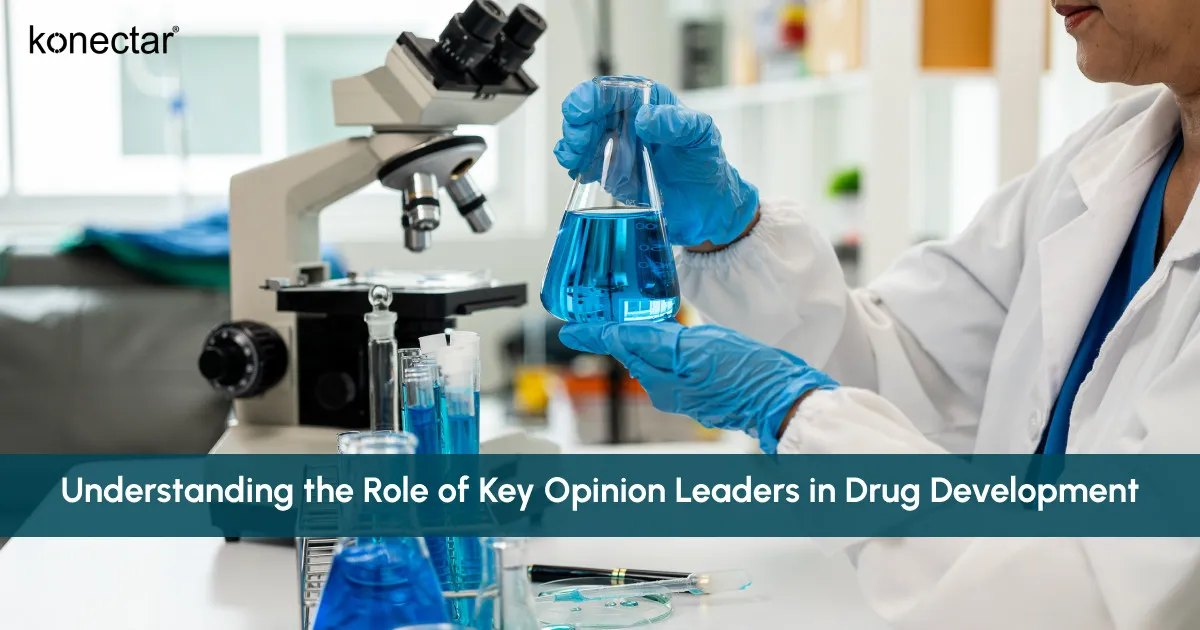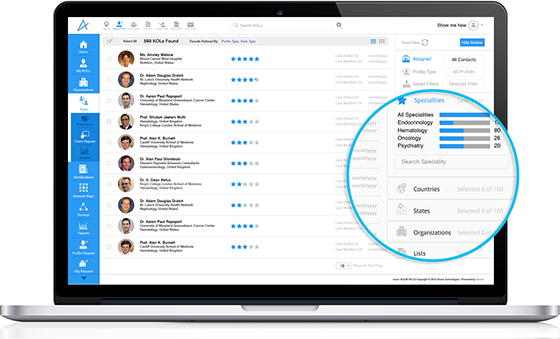27-12-2024
Understanding the Role of Key Opinion Leaders in Drug Development

The pharmaceutical industry faces significant challenges in developing new drugs that are effective and safe. In addition, navigating the stringent regulatory environment is no easy task. These two factors necessitate collaboration with key opinion leaders (KOLs).
In this article:
Key Opinion Leaders (KOLs) in pharma are trusted medical experts. They use their deep medical knowledge and real-world experience to guide every stage of drug development. This ranges from early research to final adoption.
By working with these key healthcare opinion leaders, pharma companies can create products that better meet patient needs.
Influence of KOLs on Drug Development
Concept & Research Phase
During the initial phases of drug development, KOLs are integral in shaping the direction and viability of potential treatments. Their involvement includes:
1. Idea Validation : KOLs help validate the initial concepts for new drugs based on their understanding of medical needs.
2. Target Identification : They assist in identifying and validating therapeutic targets most likely to succeed in treating specific diseases.
3. Research Direction : KOLs guide the focus of research activities, ensuring that they align with current medical trends.
4. Grant and Funding Acquisition : Their endorsement can be critical in securing funding for research, whether from governmental grants, private investors, or through partnerships with pharmaceutical companies.
Their input at this early stage is vital to ensuring that the research has a clear and focused direction, increasing the likelihood of successful outcomes.
Preclinical and Clinical Trials
Key opinion leaders shape both the design and execution of preclinical and clinical trials. Their input ensures studies meet high standards of scientific accuracy and real-world relevance.
1. Trial Design : KOLs help plan trials by choosing the right dosages, treatment schedules, and goals to best show a drug’s safety and effectiveness.
2. Patient Recruitment and Retention : They guide strategies to recruit and keep patients, making sure the trial group matches the people who will use the drug.
3. Data Interpretation : KOLs play a crucial role in analyzing trial data and deciding whether the drug should move to the next trial phase.
4. Safety Monitoring : Key opinion leaders often monitor the drug's safety during trials, provide expert opinions on adverse effects, and recommend modifications if necessary.
Regulatory Approval
As drugs move from trials to the approval phase, KOLs continue to play a pivotal role in the following ways:
1. Regulatory Strategy : KOLs in healthcare help develop strategies for engaging with regulatory bodies, advising on how best to present the drug and its clinical trial data.
2. Documentation and Presentation : KOLs often contribute to preparing documentation for regulatory submissions, ensuring that it accurately reflects the clinical benefits and scientific evidence of the drug.
3. Advisory Panels : As esteemed opinion leaders in healthcare, they offer their expert opinions to guide regulatory decisions to help guide regulatory decisions.
Benefits of KOL Involvement in Drug Development
KOLs bring a host of benefits that enhance the drug development process from conception to market entry.
Their involvement gives pharmaceutical companies a competitive edge, enhancing the credibility, regulatory compliance, market penetration, and overall success of new drugs.
Enhanced Credibility and Trust
Due to their respected status, KOLs lend a significant degree of credibility and trust to the drug development process.
Their involvement ensures that the underlying science behind the drug and clinical data are rigorously evaluated, adding a layer of validation that is critical in medical contexts.
KOLs help build trust with patient groups and the public by transparently addressing concerns and advocating for the drug’s benefits based on solid evidence.
Accelerated Regulatory Approvals
Given their influential positions, key opinion leaders in healthcare can expedite approval by proactively preparing comprehensive, clear, and persuasive documentation for regulatory submissions.
Their direct interactions with regulatory agencies during advisory committee meetings also support the drug approval process. Their respected status lends additional weight to the data and arguments presented during approval processes.
In short, the involvement of KOLs shortens the time it takes for a drug to be approved, from submission to approval, bringing medications to the market quicker.
Facilitating Market Access & Adoption Rates
Post approval, KOL involvement facilitates the process of market adoption.
Their educational sessions, research papers, and conference participations educate other HCPs about the new drug, advocating for drug adoption based on clinical evidence.
They also extend their expertise in helping pharma companies devise and implement market penetration strategies by identifying medical centers and early adopters who can start the process.
Through continuous engagement and collaboration, KOLs build momentum for drug usage and address emerging concerns or barriers to adoption in real-time.
Managing KOL Relationships for Mutually Beneficial Partnerships
The key to successful collaboration with key opinion leaders lies in maintaining and managing these relationships to ensure that both parties benefit and contribute positively towards advancement.
Some essential strategies for managing KOL relationships are:
Clear Communication Channels
Establishing and maintaining open, transparent communication channels is foundational to effectively managing KOL relationships.
Scheduling regular interactions, such as in-person or virtual meetings, ensures an ongoing dialogue. This also helps establish an advantageous feedback loop. This allows for clear communication of project goals, timelines, and any emerging issues.
Explicit Expectations and Boundaries
Communicating expectations and boundaries is vital for defining the roles, especially when working with KOLs in pharma. Outlining the roles and responsibilities within projects clarifies the job role from the beginning.
Specifying what is expected regarding deliverables, timelines, and the extent of involvement provides KOLs with an idea of organizational expectations.
Establishing boundaries ensures that the relationship remains professional and focused on mutual goals.
Regular Training and Updates
Professional upskilling is an essential facet of the job role. Keeping KOLs informed and trained on the latest developments in the field and within the company is key.
Regular training and updates enhance the KOL’s ability to advocate effectively for the company’s products and strengthen their commitment to the partnership.
Conclusion
Key opinion leaders are an integral part of the healthcare landscape, with their role in guiding drug development from its conception to market adoption.
Their expertise enhances credibility, accelerates regulatory approvals, and ensures effective market penetration. Effective KOL management, emphasizing clear communication, defined expectations, and ongoing engagement, is crucial for leveraging their insights and making this partnership mutually beneficial.
FAQs
- What is the role of KOLs in the pharma industry?
KOLs act as thought leaders, build trust, advocate, and educate about the products in the pharma industry.
-
What is the KOLs’ influence on the drug development process?
KOls influence all stages of drug development, from conception to post-market surveillance.
-
What are the benefits of KOL involvement in the drug development process?
KOLs provide benefits like credibility and trust, strategic insights into drug development, accelerated regulatory approvals, and facilitating market access and adoption rates.
-
How to manage KOL relationships for mutually beneficial partnerships?
Managing KOL relationships to ensure mutually beneficial partnerships involves establishing clear communication channels, explicitly communicating expectations, and more.





